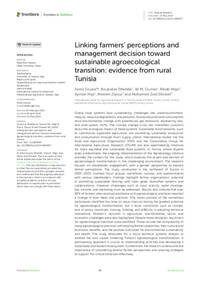Linking farmers’ perceptions and management decision toward sustainable agroecological transition: evidence from rural Tunisia

Authors:
Global food systems face sustainability challenges like undernourishment, inequity, resource degradation, and pollution. Food production and consumption drive environmental change with greenhouse gas emissions, biodiversity loss, and land-system shifts. The climate change crisis has intensified concerns about the ecological impact of these systems. Sustainable food networks, such as community-supported agriculture, are promoting sustainable production and consumption through short supply chains. International bodies like the Food and Agriculture Organization (FAO) and the Consultative Group for International Agricultural Research (CGIAR) are also spearheading initiatives for more equitable and sustainable food systems. In Tunisia, where dryland areas predominate, the ongoing implementation of the Agroecology Initiative provides the context for this study, which explores the drivers and barriers of agroecological transformation in this challenging environment. The research focuses on stakeholder engagement, with a gender perspective to explore farmer perceptions. The study, conducted in the northwest of Tunisia in 2022–2023, involved focus groups, workshops, surveys, and questionnaires with various stakeholders. Findings highlight farmer organizations’ potential in promoting sustainable farming, with clear goals, diversified systems, and collaborations. However, challenges such as input scarcity, water shortage, low income, and marketing must be addressed. Results also indicate that over 90% of farmers who received assistance with agroecological practices reported a change in their ideas and practices. Fifty seven percent of the workshops participants identified the olive oil value chain as having the greatest potential for agroecological transformation, but it faces constraints such as climate, lack of policy incentives, training, funding, and difficulty in adopting technical innovations. Women’s inclusion in agriculture, environmental, social, and economic challenges were also highlighted. Despite these obstacles, key drivers for agroecological transition were identified. These include the compatibility of many agroecological practices with existing farmer capabilities, their cultural and economic benefits, and the positive outcomes for environmental sustainability and health. The study advocates for a socio-technical systems analysis to address the root causes hindering Tunisia’s agroecological transformation. A participatory approach is crucial to understanding priorities and developing a sustainable and resilient food system. Furthermore, the research underscores the
importance of considering diverse farmer perspectives and tailoring strategies to support this critical transition effectively.
